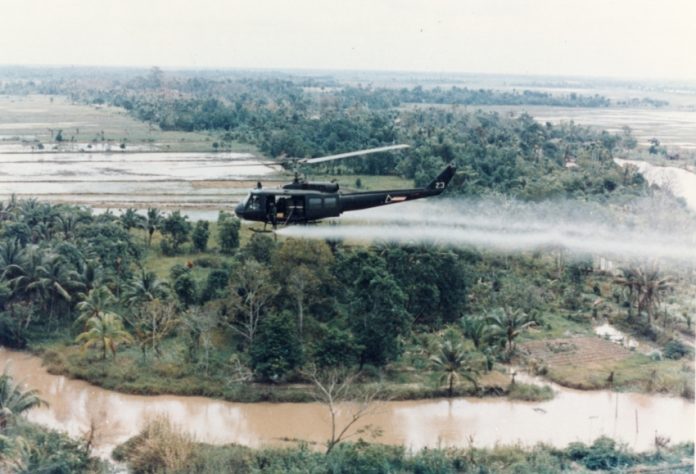The devastating effects of Agent Orange continue to haunt Laos nearly 50 years after the U.S. military sprayed over 600,000 gallons of the toxic herbicide during the Vietnam War. The herbicide, intended to clear jungle foliage along the Ho Chi Minh Trail, has left generations grappling with disabilities and health issues.
As described by Radio Free Asia, a survey by the Vermont-based War Legacies Project found over 769 individuals in five districts suffering from birth defects and disabilities attributed to Agent Orange exposure. The highest rates were recorded in Samouay district, Salavan province, where blindness, ALS, and congenital disabilities are common.
A local official noted to Radio Free Asia, “Agent Orange contaminated the water and soil, passing its effects through the food chain, impacting multiple generations.”
Efforts to address this legacy are underway, the U.S.-funded Okard program, established in 2017, has expanded to districts like Nong in Savannakhet province, providing healthcare, vocational training, and community-building initiatives. A doctor from Nong district described the suffering of locals to Radio Free Asia, stating, “Many have been disabled since birth due to Agent Orange.”
According to Hmong Daily News, Susan Hammond, founder of the War Legacies Project, whose father was a Vietnam War veteran, emphasized the disparity in aid between Vietnam and Laos. “The U.S. government provides between $30 to $40 million annually to Vietnam for Agent Orange-related disabilities, while Laos receives a fraction—recently, $1.5 million was added to a bill,” Hammond explained. The Lao government remains cautious, partly due to the undeclared nature of the war and concerns about U.S. legal liability.
Actor Bee Vang, who interned with the War Legacies Project, highlighted the need for awareness within the diaspora. “Agent Orange affects so many of these indigenous and ethnic minority groups who had a stake in this. It’s important for us to pay attention here in the diaspora,” he said.
Though progress is slow, initiatives like Okard and the War Legacies Project aim to mitigate the damage, focusing on medical care, education, and advocacy to ensure affected communities receive the support they deserve.
AsAmNews is published by the non-profit, Asian American Media Inc.
We are supported through donations and such charitable organizations as the Robert Wood Johnson Foundation. A big thank you to all our readers who supported our year-end giving campaign. You helped us not only reach our goal, you busted through it. Donations to Asian American Media Inc and AsAmNews are tax-deductible. It’s never too late to give.
Please also follow us on Instagram, TikTok, Facebook, YouTube and X.

